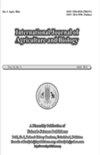夏热期人工授精和精液延长剂对提高雌兔繁殖能力的作用
Q2 Agricultural and Biological Sciences
引用次数: 0
摘要
本研究旨在与自然交配(NM)相比,利用人工授精(AI)技术提高雌兔在夏季高温环境下的繁殖性能,并确定可用于人工授精的更好的稀释剂。本研究采用了45只新西兰白(NZW)母兔。雌兔分为三组。首先,兔子通过自然交配(NM)进行交配。第二组和第三组,分别使用AI与三柠檬酸盐葡萄糖扩展器和柠檬酸盐蛋黄扩展器交配。实验持续了7月和8月,从直接交配开始,一直持续到怀孕和哺乳兔子,直到后代断奶。结果显示,与第一组NM相比,两组AI的受孕率(CR)、产仔数、兔子体重以及出生和断奶时的产仔数均有显著改善。交配后第15天和第28天,两组AI的P4水平分别显著高于NM。在雌兔的繁殖性能方面,特别是在埃及夏季的高温环境下,柠檬酸三酯葡萄糖增量剂的AI技术优于柠檬酸蛋黄增量剂的人工智能技术。©2022 Friends Science出版社本文章由计算机程序翻译,如有差异,请以英文原文为准。
The Role of Artificial Insemination and the Type of Semen Extender in Improving the Reproductively of Female Rabbits during the Hot Summer Season
The study aimed to improve the reproductive performance of female rabbits under the high environmental temperature of the summer season using artificial insemination (AI) techniques as compared with natural mating (NM) and defining the better dilution extender that may be used in AI. 45 virgin female New Zealand white (NZW) rabbits were employed in this study. Female rabbits were distributed to three groups. First, rabbits were mated by natural mating (NM). Groups two and three, rabbits were mated using AI with tris-citrate-glucose extender and citrate-egg yolk extender, respectively. The experiment lasted July and August months beginning from mating directly and continuing during pregnancy and suckling their bunnies till completion the weaning of offspring. Results showed that significant improvement in conception rate (CR), litter number, bunny weight, and litter weight at birth and weaning were observed in the two groups of AI compared with the first group of NM. P4 levels in the two groups of AI were higher significantly than NM at days 15 and 28 after mating, respectively. AI technique with tris-citrate-glucose extender is better than AI technique with citrate-egg yolk extender in the reproductive performance of female rabbits, especially, under the high environmental temperature of the summer season in Egypt. © 2022 Friends Science Publishers
求助全文
通过发布文献求助,成功后即可免费获取论文全文。
去求助
来源期刊

International Journal of Agriculture and Biology
AGRICULTURE, MULTIDISCIPLINARY-
CiteScore
1.70
自引率
0.00%
发文量
40
审稿时长
5 months
期刊介绍:
Information not localized
 求助内容:
求助内容: 应助结果提醒方式:
应助结果提醒方式:


